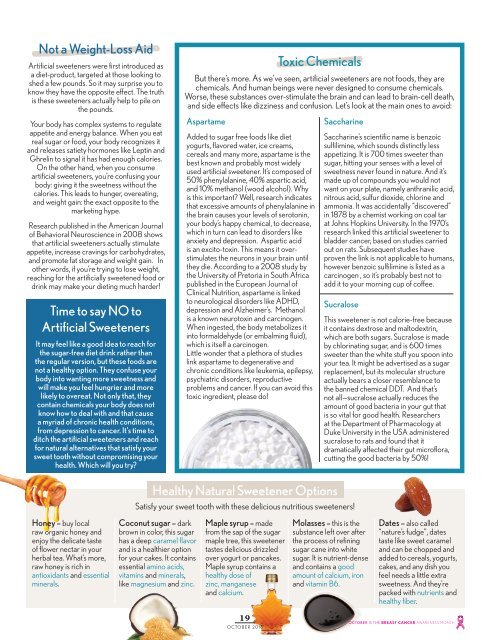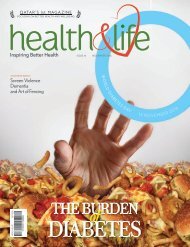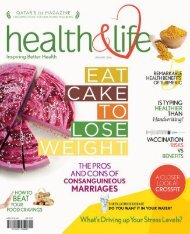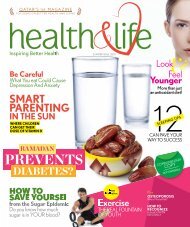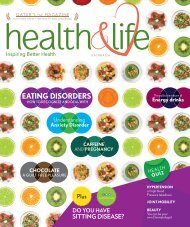Health and Life Magazine October 2016
Health and Life Magazine October 2016
Health and Life Magazine October 2016
You also want an ePaper? Increase the reach of your titles
YUMPU automatically turns print PDFs into web optimized ePapers that Google loves.
Not a Weight-Loss Aid<br />
Artificial sweeteners were first introduced as<br />
a diet-product, targeted at those looking to<br />
shed a few pounds. So it may surprise you to<br />
know they have the opposite effect. The truth<br />
is these sweeteners actually help to pile on<br />
the pounds.<br />
Your body has complex systems to regulate<br />
appetite <strong>and</strong> energy balance. When you eat<br />
real sugar or food, your body recognizes it<br />
<strong>and</strong> releases satiety hormones like Leptin <strong>and</strong><br />
Ghrelin to signal it has had enough calories.<br />
On the other h<strong>and</strong>, when you consume<br />
artificial sweeteners, you’re confusing your<br />
body: giving it the sweetness without the<br />
calories. This leads to hunger, overeating,<br />
<strong>and</strong> weight gain: the exact opposite to the<br />
marketing hype.<br />
Research published in the American Journal<br />
of Behavioral Neuroscience in 2008 shows<br />
that artificial sweeteners actually stimulate<br />
appetite, increase cravings for carbohydrates,<br />
<strong>and</strong> promote fat storage <strong>and</strong> weight gain. In<br />
other words, if you’re trying to lose weight,<br />
reaching for the artificially sweetened food or<br />
drink may make your dieting much harder!<br />
Time to say NO to<br />
Artificial Sweeteners<br />
It may feel like a good idea to reach for<br />
the sugar-free diet drink rather than<br />
the regular version, but these foods are<br />
not a healthy option. They confuse your<br />
body into wanting more sweetness <strong>and</strong><br />
will make you feel hungrier <strong>and</strong> more<br />
likely to overeat. Not only that, they<br />
contain chemicals your body does not<br />
know how to deal with <strong>and</strong> that cause<br />
a myriad of chronic health conditions,<br />
from depression to cancer. It’s time to<br />
ditch the artificial sweeteners <strong>and</strong> reach<br />
for natural alternatives that satisfy your<br />
sweet tooth without compromising your<br />
health. Which will you try?<br />
Toxic Chemicals<br />
But there’s more. As we’ve seen, artificial sweeteners are not foods, they are<br />
chemicals. And human beings were never designed to consume chemicals.<br />
Worse, these substances over-stimulate the brain <strong>and</strong> can lead to brain-cell death,<br />
<strong>and</strong> side effects like dizziness <strong>and</strong> confusion. Let’s look at the main ones to avoid:<br />
Aspartame<br />
Added to sugar free foods like diet<br />
yogurts, flavored water, ice creams,<br />
cereals <strong>and</strong> many more, aspartame is the<br />
best known <strong>and</strong> probably most widely<br />
used artificial sweetener. It’s composed of<br />
50% phenylalanine, 40% aspartic acid,<br />
<strong>and</strong> 10% methanol (wood alcohol). Why<br />
is this important? Well, research indicates<br />
that excessive amounts of phenylalanine in<br />
the brain causes your levels of serotonin,<br />
your body’s happy chemical, to decrease,<br />
which in turn can lead to disorders like<br />
anxiety <strong>and</strong> depression. Aspartic acid<br />
is an excito-toxin. This means it overstimulates<br />
the neurons in your brain until<br />
they die. According to a 2008 study by<br />
the University of Pretoria in South Africa<br />
published in the European Journal of<br />
Clinical Nutrition, aspartame is linked<br />
to neurological disorders like ADHD,<br />
depression <strong>and</strong> Alzheimer’s. Methanol<br />
is a known neurotoxin <strong>and</strong> carcinogen.<br />
When ingested, the body metabolizes it<br />
into formaldehyde (or embalming fluid),<br />
which is itself a carcinogen.<br />
Little wonder that a plethora of studies<br />
link aspartame to degenerative <strong>and</strong><br />
chronic conditions like leukemia, epilepsy,<br />
psychiatric disorders, reproductive<br />
problems <strong>and</strong> cancer. If you can avoid this<br />
toxic ingredient, please do!<br />
Saccharine<br />
Saccharine’s scientific name is benzoic<br />
sulfilimine, which sounds distinctly less<br />
appetizing. It is 700 times sweeter than<br />
sugar, hitting your senses with a level of<br />
sweetness never found in nature. And it’s<br />
made up of compounds you would not<br />
want on your plate, namely anthranilic acid,<br />
nitrous acid, sulfur dioxide, chlorine <strong>and</strong><br />
ammonia. It was accidentally “discovered”<br />
in 1878 by a chemist working on coal tar<br />
at Johns Hopkins University. In the 1970’s<br />
research linked this artificial sweetener to<br />
bladder cancer, based on studies carried<br />
out on rats. Subsequent studies have<br />
proven the link is not applicable to humans,<br />
however benzoic sulfilimine is listed as a<br />
carcinogen , so it’s probably best not to<br />
add it to your morning cup of coffee.<br />
Sucralose<br />
This sweetener is not calorie-free because<br />
it contains dextrose <strong>and</strong> maltodextrin,<br />
which are both sugars. Sucralose is made<br />
by chlorinating sugar, <strong>and</strong> is 600 times<br />
sweeter than the white stuff you spoon into<br />
your tea. It might be advertised as a sugar<br />
replacement, but its molecular structure<br />
actually bears a closer resemblance to<br />
the banned chemical DDT. And that’s<br />
not all—sucralose actually reduces the<br />
amount of good bacteria in your gut that<br />
is so vital for good health. Researchers<br />
at the Department of Pharmacology at<br />
Duke University in the USA administered<br />
sucralose to rats <strong>and</strong> found that it<br />
dramatically affected their gut microflora,<br />
cutting the good bacteria by 50%!<br />
<strong>Health</strong>y Natural Sweetener Options<br />
Satisfy your sweet tooth with these delicious nutritious sweeteners!<br />
Honey – buy local<br />
raw organic honey <strong>and</strong><br />
enjoy the delicate taste<br />
of flower nectar in your<br />
herbal tea. What’s more,<br />
raw honey is rich in<br />
antioxidants <strong>and</strong> essential<br />
minerals.<br />
Coconut sugar – dark<br />
brown in color, this sugar<br />
has a deep caramel flavor<br />
<strong>and</strong> is a healthier option<br />
for your cakes. It contains<br />
essential amino acids,<br />
vitamins <strong>and</strong> minerals,<br />
like magnesium <strong>and</strong> zinc.<br />
Maple syrup – made<br />
from the sap of the sugar<br />
maple tree, this sweetener<br />
tastes delicious drizzled<br />
over yogurt or pancakes.<br />
Maple syrup contains a<br />
healthy dose of<br />
zinc, manganese<br />
<strong>and</strong> calcium.<br />
Molasses – this is the<br />
substance left over after<br />
the process of refining<br />
sugar cane into white<br />
sugar. It is nutrient-dense<br />
<strong>and</strong> contains a good<br />
amount of calcium, iron<br />
<strong>and</strong> vitamin B6.<br />
Dates – also called<br />
“nature’s fudge”, dates<br />
taste like sweet caramel<br />
<strong>and</strong> can be chopped <strong>and</strong><br />
added to cereals, yogurts,<br />
cakes, <strong>and</strong> any dish you<br />
feel needs a little extra<br />
sweetness. And they’re<br />
packed with nutrients <strong>and</strong><br />
healthy fiber.<br />
19<br />
OCTOBER IS THE BREAST CANCER AWARENESS MONTH<br />
OCTOBER <strong>2016</strong>


